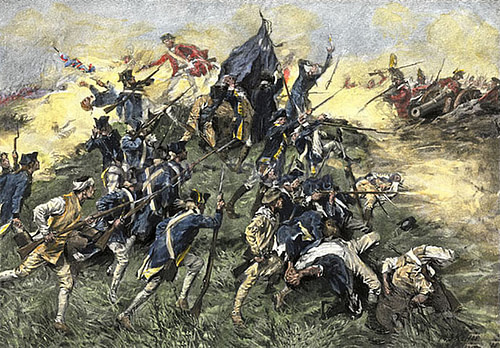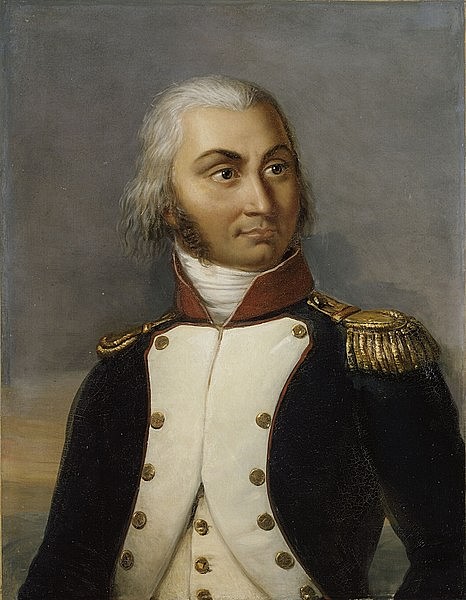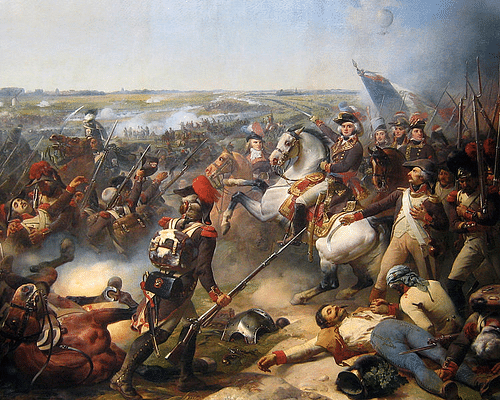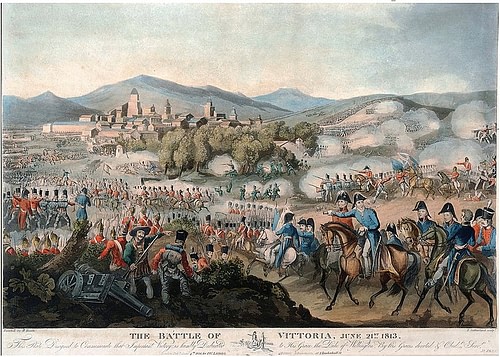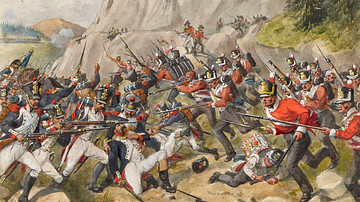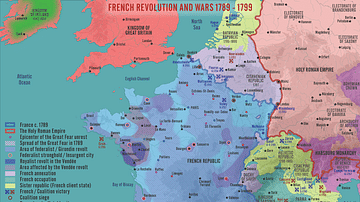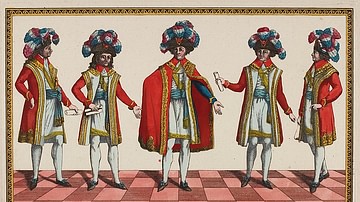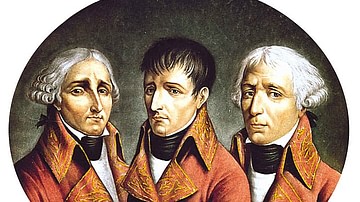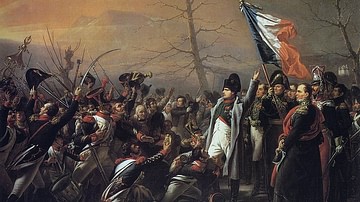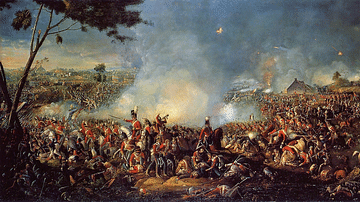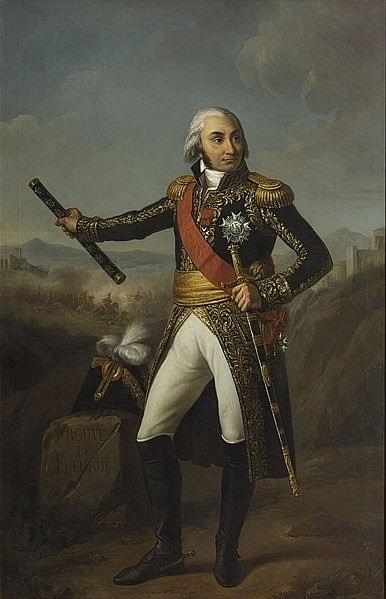
Jean-Baptiste Jourdan (1762-1833) was a French general who held significant commands in the French Revolutionary Wars (1792-1802) and the Napoleonic Wars (1803-1815). He won a major victory for the French Republic at the Battle of Fleurus in 1794 and was among the first 14 men to be appointed marshal of the empire by Napoleon I in 1804.
Despite the military victories he achieved early in his career, primarily in the War of the First Coalition (1792-1797), Jourdan would have less success during his service to the First French Empire. He was confined to an ineffective post in Spain during the Peninsular War (1807-1814) where he was often ignored by the other French generals who were nominally under his command. Jourdan suffered a major defeat at the Battle of Vitoria in June 1813, which ended French control of Spain and contributed to the collapse of Napoleon's empire. After Napoleon's exile to St. Helena, Jourdan was reconciled with the Bourbons, although he later supported the July Revolution of 1830.
In the Royal Army
Jean-Baptiste Jourdan was born on 29 April 1762 in Limoges in the department of Haute-Vienne. His mother died when he was two and his father, a poor surgeon, died a few years later, leaving Jourdan as an orphan at the age of nine. Thanks to the help of an uncle, he was educated at a boarding school in Provence. Upon graduating, he traveled to Lyon to work as an apprentice clerk in a clothing shop owned by another uncle. Yet Jourdan was evidently unsatisfied with this line of work. In 1778, after less than a year of working in his uncle's shop, Jourdan enlisted with the Auxerrois Regiment of the French Royal Army, shortly after his 16th birthday. Although Jourdan's status as a poor commoner precluded much advancement within the rigid hierarchy of the Bourbon army, a military career still offered a chance at a new life.
The same year that Jourdan enlisted, the Kingdom of France joined the American War of Independence and declared war on Great Britain. In December 1778, after eight months of training, Jourdan's regiment departed for the West Indies. Under the command of Comte d'Estaing, Jourdan participated in the capture of British-held Grenada in July 1779, his first taste of combat. On 9 October, Jourdan and the Auxerrois regiment took part in d'Estaing's disastrous assault on the British defenses during the Siege of Savannah. The battle proved to be one of the bloodiest of the war, resulting in heavy casualties for the Franco-American force including the Polish cavalry officer Casimir Pulaski, who was mortally wounded.
D'Estaing's defeated forces sailed back into the West Indies where they participated in the defense of Saint Vincent in 1780 and the invasion of Tobago in 1781. The men of the Auxerrois regiment, unaccustomed to the climate of the Caribbean, were often ravaged by diseases, and Jourdan came down with a severe illness that required he be sent back to France in January 1782. His illness was diagnosed as a hernia though it was probably some form of intestinal disease; whatever it was, Jourdan would be plagued by this illness at intervals for the rest of his life. It took two years before Jourdan recovered enough to return to active duty. By this point, the war was over, and Jourdan was discharged from the army on 26 July 1784. Despite his six years of service, he was still only a private.
In the Revolutionary Army
After quitting the army, Jourdan returned to Limoges where he opened a modestly successful haberdashery. In 1788, he married a dressmaker, with whom he would have five daughters, and settled down to live what he must have thought would be a normal life. But in May 1789, French society was turned on its head when the French Revolution erupted in Versailles. Jourdan welcomed the Revolution with open arms and soon became a republican. In July 1789, he was elected captain in the Limoges National Guards. He reentered the army in 1791 after the revolutionary government, the National Assembly, called for 169 volunteer battalions to be raised, enlisting in the 2nd Haute-Vienne volunteers. Thanks to his previous military experience, he was elected chef de bataillon for the unit.
With the outbreak of the War of the First Coalition in 1792, Jourdan's battalion was part of the Armée du Nord (Army of the North) which was tasked with the invasion of the Austrian Netherlands (Belgium). Jourdan led his battalion with valor at both the Battle of Jemappes (6 November 1792) and the Battle of Neerwinden (18 March 1793). His conduct earned him a promotion to general of brigade on 27 May 1793. He was promoted again only two months later to general of division. Jourdan's rapid advancement came about thanks to the officer shortage plaguing Revolutionary France; many officers had either become disillusioned with the Revolution and fled France or had been arrested on counter-revolutionary charges, allowing men like Jourdan to advance based on merit.
On 7-8 September 1793, the Armée du Nord attacked a Coalition army at the Battle of Hondschoote. Now at the head of an entire division, Jourdan distinguished himself by leading a successful advance that helped lead the French to victory, sustaining a minor chest wound in the process. He had barely recovered from his injury when, on 22 September, he received word that he had been given command over the entire Armée du Nord; the previous commander, Jean-Nicolas Houchard, had been arrested, accused of cowardice and treason, and was soon to be guillotined. Jourdan's rapid advancement was therefore a double-edged sword; the fate of Houchard served as a sobering reminder that every military officer was at the mercy of the Committee of Public Safety, the de facto government of the French Republic, during the paranoia-fueled days of the Reign of Terror. Anything less than victory could be interpreted as intentional sabotage or cowardice.
As if to drive this point home, Jourdan was joined in his new command by Lazare Carnot, one of the twelve members of the Committee of Public Safety. Carnot ordered Jourdan to march with all haste to Maubeuge, a vital French fortress that was under siege by a Coalition army led by Prince Josias of Saxe-Coburg-Saalfeld. Jourdan complied and defeated Coburg on 15-16 October 1793 at the Battle of Wattignies. Although the victory rightfully belonged to Jourdan, Carnot took sole credit upon his return to Paris. This created animosity between the two men, which boiled over that winter when Jourdan refused an order from the Committee of Public Safety to cross the Sambre and attack the enemy. Jourdan argued that his army was in no state for a winter campaign, pointing out that "the infantry have no shoes, the cavalry no foliage, and the artillery no horses" (Glover, 160).
As a result of his perceived insubordination, Jourdan received the dreaded summons to Paris. He stood before the Committee of Public Safety on 10 January 1794 and was presented with a warrant for his arrest signed by Carnot, Maximilien Robespierre, and Collot d'Herbois. Jourdan was likely only saved from the guillotine's blade by a representative from the National Convention, Ernest-Joseph Duquesnoy, who had been present at Wattignies. Duquesnoy not only vouched for Jourdan's character but also contradicted Carnot's version of events with such vitriol that Carnot was apparently reduced to tears. The Committee could no longer arrest Jourdan and opted instead to force him into retirement, allowing him an annual pension of 3,000 livres. He returned to his haberdashery in Limoges, but only a month later he was recalled to the front.
Victory & Defeat
In late May 1794, Jourdan was put in command of a new army of 96,000 men, dubbed the Armée de Sambre-et-Meuse. This new force was tasked with crossing the Sambre and laying siege to the vital Belgian fortress of Charleroi, which Jourdan did on 12 June. Four days later, Jourdan was attacked by an Anglo-Dutch army of 43,000 men, which emerged from the heavy mists and took him by surprise. The Battle of Lambusart resulted in 3,000 French casualties, and Jourdan was forced back across the Sambre. The defeat did nothing to lessen French morale, however, and only two days later, Jourdan's army had recrossed the Sambre and laid siege to Charleroi yet again. The fortress capitulated on 25 June, only hours before a Coalition army under Coburg arrived to relieve it.
Under the false assumption that the Charleroi garrison had not surrendered, Coburg ordered an attack on Jourdan's army on the morning of 26 June. The ensuing fight, the Battle of Fleurus, lasted throughout the day and ended with a French victory, despite heavy losses on both sides. The battle proved to be one of the most decisive of the war; it convinced the Austrians to abandon the defense of the Low Countries, allowing Jourdan to complete the conquest of Belgium by the end of July. Fleurus also preceded the end of the Terror and the Committee of Public Safety, which relieved France's officers from the looming threat of the guillotine. Most importantly for Jourdan, victory at Fleurus made him famous and covered him in glory. It was undoubtedly the high point of his career.
In 1796, Jourdan was tasked by the new government, the French Directory, with an attack on Vienna. It was to be a three-pronged campaign; Jourdan and General Jean-Victor Moreau would each lead an army through the Rhineland, while General Napoleon Bonaparte was to advance by way of Italy. While Napoleon's Italian Campaign would become the stuff of legend, Jourdan and Moreau were far less successful. Jourdan's army ended up outpacing Moreau, meaning that he alone received the brunt of the Austrian counterattack. Jourdan was defeated several times by the Austrian general Archduke Charles, most notably at the Battle of Würzburg (3 September 1796), forcing him to withdraw to the Rhine. Lacking Jourdan's support, Moreau was also forced to withdraw, and the German campaign ended in failure. Shortly after, Jourdan's illness flared up again, forcing him to resign his command.
Jourdan's botched German campaign blighted his military reputation, causing him to forego the army and try his hand at politics. In 1797, he won election to the Council of 500, representing his native Haute-Vienne. Jourdan was elected as a Jacobin, swept into office during the leftist resurgence that followed the coup of 18 Fructidor, and became president of the Council of 500 in 1798. When the outbreak of the War of the Second Coalition (1798-1802) found France in need of fresh soldiers, Jourdan authored the edict that was popularly known as the ‘Jourdan Law'; mimicking the infamous conscription laws of 1793, Jourdan's Law called for all unmarried males between the ages of 20-25 be available for conscription. In 1799, Jourdan once again took the reins of an army but was defeated by the Austrians at the Battle of Stockach on 25 March.
Marshal of the Empire
While Jourdan's martial reputation had been marred by defeats since Fleurus, the star of his colleague, Napoleon Bonaparte, had only been rising. In late 1799, Bonaparte approached Jourdan to ask for his support in an upcoming coup to replace the Directory. Although Jourdan had no love for the corrupt Directory, his vision for a new government did not align with Bonaparte's, and he refused to support the coup. Bonaparte's Coup of 18 Brumaire (9 November 1799) proved successful, leading to the overthrow of the Directory and the end of the French Revolution. Bonaparte, now serving as First Consul, appointed Jourdan inspector-general of cavalry and infantry in 1800.
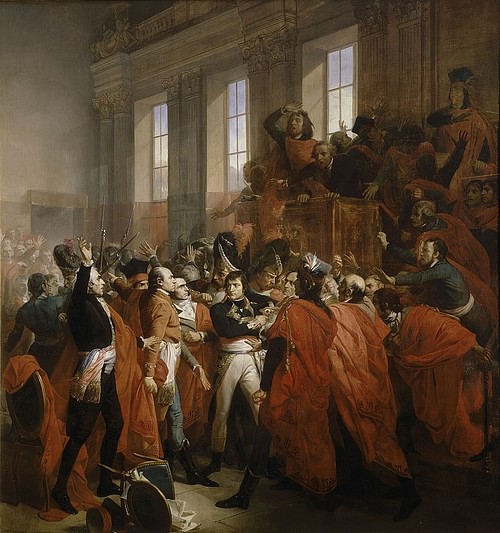
In 1804, Bonaparte established the First French Empire and crowned himself as Napoleon I. That same year, the office of ‘marshal of the empire' was established, and Napoleon appointed 14 men to the position. Jourdan was among this initial batch of marshals; although the title was supposed to go only to France's most distinguished generals, Napoleon was known to appoint men to the position for political reasons. Jourdan, who still enjoyed much renown and influence from his victory at Fleurus, remained an ardent republican and Jacobin; by awarding Jourdan with a marshalate, Napoleon sought to win his loyalty.
Commanding in Spain
In 1806, Napoleon named his brother, Joseph, as king of Naples and sent Marshal Jourdan to act as his chief advisor. Joseph and Jourdan became close friends, so when Joseph was transferred to the throne of Spain in 1808, he requested that Jourdan join him as chief of staff. No sooner had they arrived in Spain before they were chased out of Madrid by Spanish rebels supported by a British army under Sir John Moore; the populations of Spain and Portugal had begun the bloody and protracted fight against French occupation known as the Peninsular War (1807-1814). Things got so bad for King Joseph that Napoleon himself had to intervene, invading the Iberian Peninsula with his 278,000-man Armée d'Espagne. Napoleon reclaimed Madrid, and a French corps under Marshal Jean-de-Dieu Soult chased the British back into Portugal after the Battle of Corunna, where Moore was killed.
Believing Spain to be mostly pacified, Napoleon returned to Paris in mid-January 1809, leaving his brother and Jourdan in charge of mopping up the remaining resistance. Of course, this was easier said than done; the Spanish were far from defeated, and the British, now under the command of Arthur Wellesley, marquess (and future duke) of Wellington, reinforced their position on the peninsula. To make matters more difficult, the French marshals nominally under Jourdan's command paid him no heed, preferring to go over his head and communicate directly with Napoleon. The emperor's replies often contained orders that contradicted Jourdan's, further undermining his authority. Despite his lack of control, Jourdan was nevertheless blamed for the French defeat at the Battle of Talavera (27-28 June 1809) and was embarrassed further when his name was left off a list of Napoleon's marshals printed in the Almanach. Faced with the emperor's displeasure, Jourdan resigned from his post in October 1809.
In 1811, Jourdan was once again posted to Spain as governor of Madrid, partially to appease King Joseph who had threatened to abdicate. The following year, as Napoleon prepared for his invasion of Russia, Joseph was given command of all French forces in Spain which meant that Jourdan, as the king's chief of staff, was once again in nominal control of the Peninsular War. Yet Napoleon had failed to make Joseph's supremacy clear to the other French commanders in Spain; lack of effective coordination contributed to the major French defeat at the Battle of Salamanca (22 July 1812). After Salamanca, Joseph and Jourdan were forced to abandon Madrid for a more secure location in Valencia. However, after joining Marshal Soult's army, they reclaimed Madrid after the Siege of Burgos in October 1812 and pushed Wellington's Allied army back into Portugal.
In early 1813, news of Napoleon's defeat in Russia reached Spain, and French troops were recalled from the Iberian Peninsula to reinforce the main French armies in Germany. King Joseph and Marshal Jourdan, therefore, were outnumbered by Wellington's restrengthened Allied army of 81,000 men at the Battle of Vitoria (21 June 1813), which resulted in a decisive French defeat; during the retreat, Jourdan was humiliated when his marshal's baton was captured. Though not as large as other Napoleonic battles, Vitoria marked the death knell of French control of Spain; by 1814, Spain was lost to the Napoleonic Empire. That same year, Napoleon abdicated for the first time, and the Bourbon monarchy was restored.
Final Years & Legacy
Jourdan pledged his allegiance to King Louis XVIII of France during the first Bourbon Restoration in 1814. Then, when Napoleon returned from exile during the Hundred Days in 1815, Jourdan once again swore his sword to the emperor, though he received no significant commands. After Napoleon's final defeat at the Battle of Waterloo, Jourdan's loyalty shifted back to the Bourbons. While this may seem like opportunistic flip-flopping, Jourdan himself did not see it that way; in his mind, he was a patriot who served France no matter who was in charge.
Though never a brilliant commander, Jourdan was a capable-enough general whose poor performance in the Napoleonic Wars was more of a result of his situation than a reflection of his ability. Reflecting on his career from his exile on St. Helena, Napoleon himself recognized this fact about Jourdan, stating:
I certainly used that man very ill…I have learned with pleasure that since my fall he invariably acted in the best manner. He has thus afforded an example of that praiseworthy elevation of mind which distinguishes men one from another. Jourdan is a true patriot; and that is the answer to many things that have been said of him.
(Glover, 168)
Indeed, Jourdan spent the rest of his life in service to France. In 1816, he was appointed governor of Grenoble and was made a Peer of France in 1819. Despite his long service first to an empire and then to a monarchy, the part of Jourdan that had rejoiced at the outbreak of the Revolution in 1789 appeared to be not entirely gone, as he supported the July Revolution of 1830 that brought King Louis-Philippe I to a more liberal French throne. Jourdan served Louis-Philippe as governor of Les Invalides for the last three years of his life. He died on 23 November 1833 at the age of 71 and was buried in Les Invalides.
